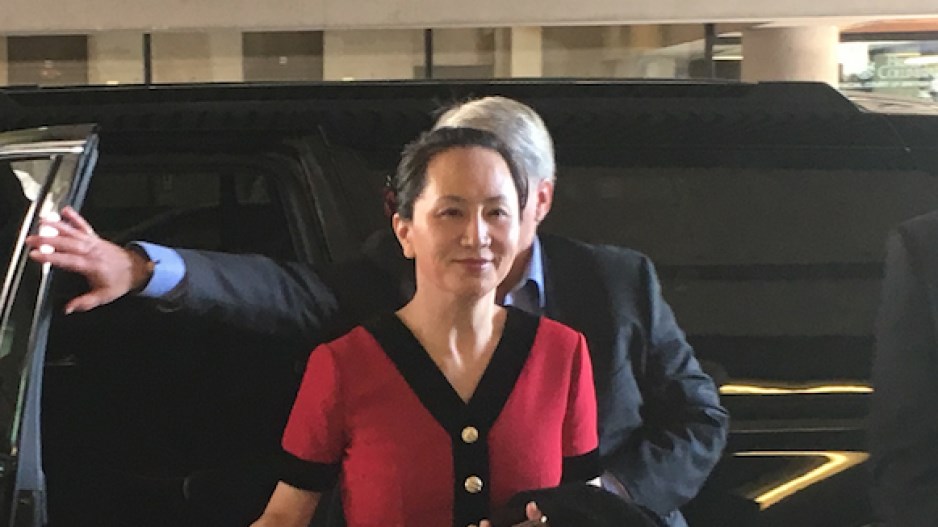The BC Supreme Court decision that will keep Huawei Technologies Co. Ltd. CFO Meng Wanzhou in Vancouver for the foreseeable future will almost guarantee additional economic sanctions and other punitive retaliations from Beijing, legal analysts say.
The assessment comes after associate justice Heather Holmes, who is presiding over the U.S. extradition request case for Meng, ruled on March 27 that U.S. allegations against the Huawei executive – including fraud, money laundering and violating U.S. trade sanctions against Iran – would constitute arrestable offences had they happened in Canada.
Some analysts said they were not surprised by the decision, given that 90% of Canadian extradition request cases result in actual extradition. Robert Adamson, lecturer at Simon Fraser University’s Beedie School of Business and an expert in business law and transborder governance, said China’s reaction is also predictable – especially given its harder line against western countries since President Xi Jinping took over in 2012.
“Based on the previous ways the Chinese government and its officials have reacted, this decision will likely be used to raise the stakes even more,” Adamson said. “I think the trials of Michael Kovrig and Michael Spavor will be fast-tracked; there will be charges. That will be escalated. There will be threats to trade and other related sanctions to Canada. Beijing has shown a willingness to play a global bullying role than ever before … and that’s going to have negative consequences for Canada.”
Kovrig and Spavor have been held by Chinese authorities since December 2018, shortly after Meng was arrested at Vancouver International Airport.
Vancouver-based immigration lawyer Richard Kurland said sanctions will hurt the Canadian economy because of the timing.
“What will be unpleasant in the short term are the economic sanctions that are going to happen at precisely the wrong time for Canada – and that’s during the COVID crisis and the oil crash,” Kurland said, adding he agrees that the Chinese case against the two Canadians will likely be accelerated.
Kurland also noted that Beijing has to worry about its image with its own power base in China, where leaders like Xi may need to take forceful measures to appease an increasingly nationalistic, jingoistic and militant form of populism emerging in the Chinese domestic scene.
“Unfortunately, this case is front row centre in China,” Kurland said. “Politicians are politicians, whether they are in Canada or China, and public opinion cannot be ignored. The pressure on the most senior Chinese politicians will result in economic sanctions for the pure survival of the political leadership.”
Part of what’s also feeding this reaction, said Yves Tiberghien, director emeritus of the University of British Columbia’s Institute of Asian Research, is that Chinese authorities, and by extension the Chinese media, were overconfident that the court would hasten the end of Meng’s detention in Vancouver.
Tiberghien added that the decision comes at a time of intense friction between China and the West, with Beijing enforcing security laws in Hong Kong to stamp out pro-democracy protests while relations with the United States over the COVID-19 crisis have fallen to their lowest point since the 1970s.
“We’ve had a small pragmatic period in Canada-China relations since last summer … and my hope is that this pragmatic phase continues,” he said. “But this day is an important one…. It’s all about how expectations will be managed on the Chinese side, but clearly there was some perception that the chance [for Meng to be released] was higher than it was. There was certainly a bubble there, and there will be disappointment.”
Adamson and Kurland emphasized, however, that Wednesday’s decision did strengthen Canada’s commitment to its extradition treaties with other rule-of-law democracies – something that should not be sacrificed despite the coming economic pressure from abroad.
“The most important thing to remember is that the reason Canada takes this approach… , that we make decisions based on principle instead of politics, is that our foundation is based on rule of law,” Adamson said. “As uncomfortable as it is – and it will get more uncomfortable in the coming days – if all Canadians remember that we are basing these decisions on principle, then we will remain on very solid ground … even if it will be painful.”
Holmes’ decision on Wednesday focused on Meng’s alleged misrepresentations about Huawei’s relationship with an affiliate firm operating in Iran at a meeting with HSBC in 2013. The meeting prompted HSBC to continue banking services with Huawei and led to loans and credit facilities for the Chinese telecom giant.
Meng’s defence argued that, since Canada is not party to U.S. sanctions on Iran, the alleged actions would not be considered fraud here, striking down a requirement for extradition. Holmes, however, disagreed.
“Ms. Meng’s approach to the double criminality analysis would seriously limit Canada’s ability to fulfil its international obligations in the extradition context for fraud and other economic crimes,” Holmes concluded. “The offence of fraud has a vast potential scope. It may encompass a very wide range of conduct, a large expanse of time, acts, people and consequences in multiple places or jurisdictions.”
Holmes also noted that the Iran sanctions are “not fundamentally contrary to Canadian values” in a way that would raise concerns about Canada enforcing unjust foreign laws.




